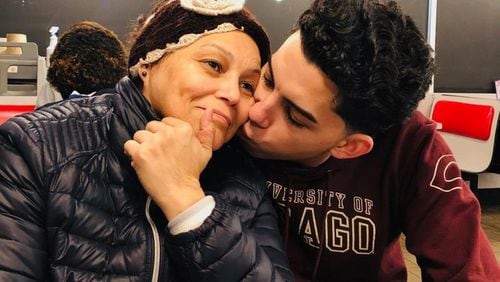Honduran consular officials are refusing to issue travel documents to federal immigration authorities who want to deport a Chamblee woman recovering from stage 4 throat cancer, citing concerns about her health.
Tania Romero, 48, a former construction worker who underwent surgery and radiation treatment and chemotherapy for her illness in 2017, is being held at the Irwin County Detention Center in Ocilla. She was arrested in Gwinnett County in August and charged with speeding and driving without a license, said her son, Cristian Padilla Romero, 24, a Cross Keys High School graduate who is pursuing a doctoral degree in history at Yale University.
Romero's case has drawn national attention, thanks in large part to her son's advocacy. Democratic presidential candidate Julián Castro and former Democratic gubernatorial candidate Stacey Abrams have tweeted in support of her, and U.S. Rep. Lucy McBath's office is assisting her family. Meanwhile, an online petition urging U.S. Immigration and Customs Enforcement to release her from detention has drawn more than 37,700 signatures, and a GoFundMe campaign has raised $39,145 for her legal and medical bills.
ICE requested travel documents for deporting her three weeks ago, according to the Honduran consulate in Atlanta. The consulate said it has refused because it is looking into whether Romero would get the medical care she needs if she were deported. The Atlanta Journal-Constitution obtained Grady Memorial Hospital records from the consulate that show she needs follow-up care at Grady and that her health should be monitored for the next four years.
“Over here, she has a hospital — all the doctors,” said Angelina Williams, the Honduran consul general for Georgia. “She has everything set up for her treatment. And in Honduras she doesn’t have insurance. She doesn’t have anything because she has been living here for more than 15 years.”
Williams said she is also taking into account that Romero is appealing her deportation with the federal Board of Immigration Appeals.
An ICE spokesman declined to comment.
Charles Kuck, a local immigration attorney who teaches law at Emory University, said it is “highly unusual for a consulate to refuse to issue a travel document, especially in the Trump era when he has issued executive orders that seek to punish countries that refuse to accept their nationals.”
“It must be a very grave situation indeed.”
Romero entered the country illegally 20 years ago. The government sent her three notices to appear in Immigration Court, but she never showed up, so she was ordered deported in absentia. Her attorney, according to Cristian, obtained records through the federal Freedom of Information Act that show she never received those notices and that they were returned to the sender.
Cristian, who was brought to America when he was seven, is being temporarily shielded from deportation by the Obama administration's Deferred Action for Childhood Removals Program, or DACA. Two of his three sisters also participate in the program. The U.S. Supreme Court heard arguments Tuesday about President Donald Trump's efforts to rescind that program. A ruling is expected next year.
“We are fearful for her life because we know that she is supposed to be watched for the next four years for her cancer,” Cristian said of his mother. “We don’t think she will be able to get the care she needs over there” in Honduras.
About the Author







